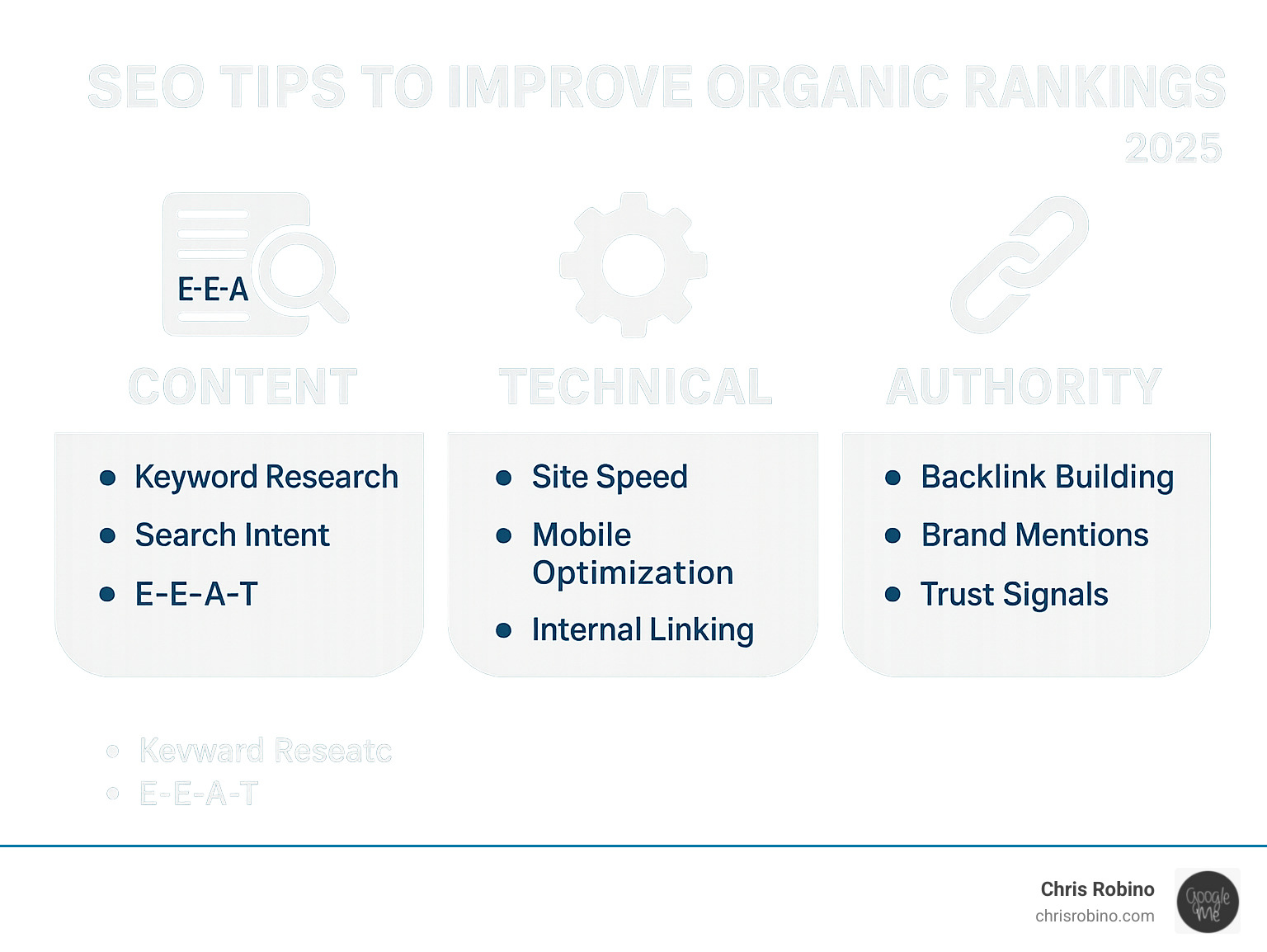The New Landscape of Search
Effective SEO tips to improve organic rankings have shifted from outdated tactics to a sophisticated blend of technical excellence and genuine value. Google’s algorithms now prioritize user experience and content that demonstrates Experience, Expertise, Authoritativeness, and Trustworthiness (E-E-A-T). With over two-thirds of all clicks going to the first five organic results, securing a top position is critical for business growth.
Modern SEO success hinges on a holistic strategy:
- Content: Create quality content that matches user search intent and demonstrates first-hand expertise.
- Technical: Ensure your site is fast, mobile-friendly, and easily crawlable with a solid internal linking structure.
- Authority: Build high-quality backlinks from relevant, authoritative sites to establish trust.
Outdated tactics can now harm your visibility. Today’s search landscape requires a nuanced understanding of how algorithms interpret context and quality.
I’m Chris Robino, and for over two decades, I’ve guided large organizations through the complexities of modern search. My expertise in SEO tips to improve organic rankings comes from hands-on experience developing intelligent SEO and AI-driven search solutions that deliver transformative results.

Core Strategies: SEO Tips to Improve Organic Rankings
Effective SEO tips to improve organic rankings require a multi-faceted approach where content, technical optimization, and authority-building work in concert. For large enterprises, this means scaling quality and precision across a complex digital footprint.
Mastering Content & Intent: The Foundation of SEO
Great content begins with understanding the ‘why’ behind a search query. This goes beyond keyword volume to deciphering user intent.
- Informational: Users seek knowledge (“how to…”, “what is…”). Provide comprehensive, clear answers.
- Navigational: Users want to find a specific site or page. Ensure your brand is easily findable.
- Transactional: Users are ready to act (“buy,” “download”). Your content must be clear and build trust.
- Commercial Investigation: Users are comparing options. Offer honest, detailed comparisons and reviews.
Long-tail keywords (e.g., “SEO tips for enterprise e-commerce sites”) are crucial. They attract highly qualified traffic with specific needs, often leading to higher conversion rates. Google’s “People also ask” is a great source for these.
Quality content demonstrates true expertise and provides real value. Focus on creating cornerstone content—comprehensive, foundational pieces on your most important topics. These assets serve as hubs in your content strategy, establishing your authority. Equally important is keeping content fresh. Regularly update existing articles with new data and insights to maintain relevance and signal to search engines that your site is current.
For more information about developing a comprehensive content strategy, explore our Content Strategy Consulting services.

On-Page & Technical Excellence: Optimizing for Crawlers and Users
Technical SEO ensures that your valuable content is findable and accessible. Key on-page elements include:
- Title Tags: Your first impression in search results. Make them descriptive and compelling.
- Meta Descriptions: Your ad copy in the SERPs. They don’t impact rankings but drive clicks.
- Header Tags (H1, H2, H3): Create a logical structure for readers and search engines.
- Image Optimization: Use descriptive alt text for accessibility and compress images for speed.
Internal linking is vital for large websites, guiding users and search engine crawlers through your content and distributing page authority. Use descriptive anchor text to signal the context of the linked page.
Key technical foundations include site speed (aim for under 3 seconds load time), mobile-first optimization (Google ranks your site based on its mobile version), and overall site health (SSL, clean code, no broken links). You can check your site speed with various online tools.
For insights into adapting your technical strategy for emerging technologies, check out our New Tech Media Strategies Guide.

Building Authority: Advanced Off-Page SEO Tips to Improve Organic Rankings
Authority is your reputation across the web, primarily built through high-quality backlinks from other credible sites. Earn these links by creating content so valuable that others want to cite it. Strategies include guest blogging on authoritative industry sites and the “skyscraper technique”—improving upon existing popular content and promoting your superior version.
This directly ties into Google’s E-E-A-T guidelines, which prioritize Experience, Expertise, Authoritativeness, and Trustworthiness. Google recently updated their Quality Rater Guidelines to emphasize first-hand experience. Demonstrating genuine expertise is non-negotiable. Avoid black hat SEO shortcuts; they lead to penalties and destroy long-term credibility.
You can see examples of how we demonstrate thought leadership and expertise in our Thought Leadership Content examples.
The Future is Now: Leveraging AI, Voice, and Local Search
Staying competitive means adapting to new search technologies.
- AI in SEO: Use AI tools for research and drafting, but always infuse content with human expertise, original insights, and fact-checking.
- Voice Search: Optimize for conversational, question-based queries that mimic how people speak.
- Local SEO: For businesses with physical locations, a complete and active business profile on major search engines is essential for local visibility.
For a deeper dive into AI-driven content strategies, explore our AI-Driven Content Strategy guide.
Measuring Success & Adapting for the Future
The journey of implementing SEO tips to improve organic rankings is an ongoing process of measurement and refinement. For large-scale SEO initiatives, robust analytics are not just useful—they are essential for proving ROI and guiding strategy.
Tracking, Analytics, and Continuous Improvement
Focus on Key Performance Indicators (KPIs) that align with business goals, not vanity metrics. Track organic search traffic, but also analyze user engagement (like dwell time) and, most importantly, conversion rates from organic visitors.
Two free types of tools are indispensable:
- Search Engine Webmaster Tools: Your direct line to search engines. Monitor which queries drive traffic, track your click-through rate (CTR), and identify technical issues. A low CTR despite high impressions often means your title tags and meta descriptions need improvement. Use these free tools to monitor these crucial metrics.
- Web Analytics Platforms: Provide deep insight into user behavior on your site. Understand the full user journey, from the first click to the final conversion, to see how your SEO efforts translate into business results.
Regularly analyzing this data reveals what’s working, allowing you to double down on successful tactics and adjust your strategy based on performance.
For comprehensive guidance on interpreting and acting on your SEO data, explore our Digital Strategy Advice services.
Staying Ahead of the Curve: Final SEO Tips to Improve Organic Rankings
Success in SEO is a long-term commitment. Meaningful results from a consistent, strategic effort often take a year or more to fully materialize. The digital landscape is always evolving, so continuous adaptation is key.
- Monitor Algorithm Updates: Google constantly refines its algorithm. Stay informed not to panic, but to understand shifts in the landscape. A focus on quality and user experience is the best defense against volatility.
- Leverage Social Media: While not a direct ranking factor, social media amplifies content, drives traffic, and builds brand authority. Shares can lead to natural backlinks, and a strong social presence reinforces trust.
- Accept Continuous Learning: The most successful SEO practitioners are adaptable and curious. Experiment, learn from data, and stay current with emerging trends like AI and voice search.
Every website is unique. The fundamental principles of SEO are universal, but their application requires a customized approach based on your industry, audience, and specific business objectives.
For specialized guidance on improving your search engine performance, visit our resource on how to Improve your Search Engine Rankings.

